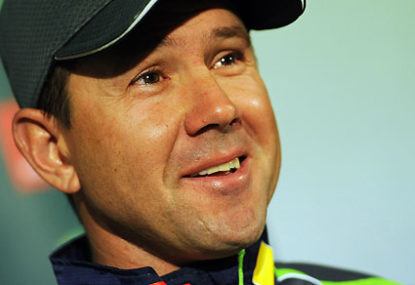'Big achievement': Jason Gillespie secures major appointment as Pakistan Test coach
Australian fast bowling great Jason Gillespie has been named head coach of Pakistan's Test team, as the nation overhauls its coaching department ahead of…

It was his pull shot that most amazed. He would be in position so early that you could reasonably wonder if he had powers of precognition, like he had known exactly where the ball would land.
It was his pull shot that was his most destructive weapon, the shot that caused bowlers the most exasperation; and it was his pull shot – when you realised he was growing less adept in its execution – that hinted Australia’s greatest batsman since Bradman was no longer the player he had been.
A strong case can be made that Ricky Ponting was the game’s most effective player. For most of his career he was his side’s best batsman. He took part in over a hundred wins, 48 as captain, the most by any player.
Only Sachin Tendulkar has more international runs, and only the Indian superstar and Jacques Kallis have more international hundreds. But neither could claim three World Cup wins, two as captain, and of the 375 ODIs Ponting played, Australia won 262 of them.
These are startling numbers in an age of startling numbers. Ponting was not just appreciated for the runs he provided. To the end he remained highly valued in the dressing room, and was an important ally and advisor to captain Michael Clarke.
When Ricky Ponting was a teenager at the Australian Cricket Academy, Rodney Marsh declared the precocious Tasmanian the best 17 year-old batsman he had ever seen. It was high praise indeed, especially coming from someone as forthright and grizzled as the former wicket-keeping great.
But it was praise that was far from being misplaced. Nicknamed ‘Punter’ for his love of gambling, his wagers would have been very lucrative if they turned out as well as Marsh’s call when he first laid eyes on Ponting.
He liked a drink too, and this got him into trouble on a few occasions early in his career. One night in Sydney, after a loss in a one-day game against England, Punter’s drinking led to an incident at a nightclub that left him unconscious, wearing a black eye, and resulted in him being dropped from the Australian side.
Shockingly, the batsman said he could not recall the incident, but admitted to his drinking problem and vowed to seek counseling and return “squeaky clean.” There was also an earlier incident at a Calcutta nightclub for which he was fined. Yet significant as these incidents were, they are mere footnotes in a long and successful career; incidents that he was able to overcome to the point that he was able to captain his country.
Ponting was as ferocious a competitor as there ever was in the game. Winning, it appeared, meant everything to him. Always up for a scrap, his unyielding and brash approach sometimes pushed the bounds of good sportsmanship and general decorum, often irking opponents and the public in the process.
The 2007/2008 series against India had reached Sydney when an assortment of umpiring errors and Australian “gamesmanship” conspired to deny India what would have been a well-earned victory. Near the end, Ponting adamantly claimed a disputed catch.
Writing in the Sydney Morning Herald, the late Peter Roebuck had this to say: “The Indians were convinced Ponting, the captain, had grounded a catch he claimed on the final afternoon at the SCG. Throughout those heated hours, the Australian remained hostile, kicking the ground, demanding decisions, pressuring the umpires.” It was an ugly display that severely angered the opponents, Indian fans, and many Australians too, many agreeing with Roebuck in demanding the sacking of their captain.
Many were also angered, at the time, by the part played by umpire Steve Bucknor. Decent man that he is, I remained sure there was nothing sinister behind his decisions. It was nothing more than a case of a high-class umpire going on past his best – much like Ponting did.
The master batsman has been way below his best for the past two or three years. His battering of a rather toothless Indian bowling attack during their last visit Down Under might have delayed his departure and given his fans hope that Punter still had something left in the tank. But he didn’t look himself against the West Indies in the Caribbean, and had a rather embarrassing first two Tests in the recently concluded South African series. He finally realised it was time to go.
It could be argued that Ponting weakened the team by hanging on for too long. But I daresay his country meant so much to him that I am sure he meant no harm, and we have all seen champion sportsmen who, approaching the end, remain convinced that the magic will soon return.
Whatever his faults – and he had a few – there can be no doubting his devotion to his country and his love for the great game and its traditions. He wore his tattered baggy green, which had to be replaced early on because the first one was stolen, for most of his career, and the manufacturers had a dickens of a time getting it off his head in order to effect repairs.
He was not the greatest fan of the T20 version of the game, and resisted attempts to shortchange first-class and Test cricket in order to accommodate cricket’s briefest form.
There are many followers of cricket, especially in India, who dislike the great Australian. Their attitude to him is understandable, for he was an uncompromising adversary. But even his detractors would have to agree that his career was long and glorious, and that the Tasmanian who liked a flutter was a warrior born.